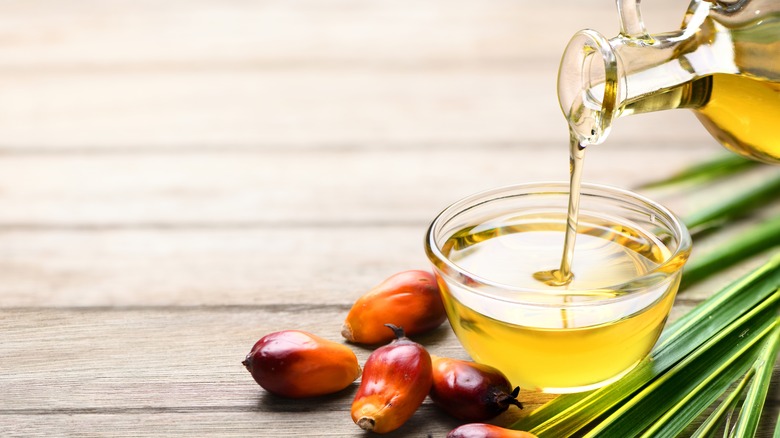The World's Cheapest Cooking Oil Isn't Actually Palm Oil
There are plenty of factors to consider when choosing a cooking oil. How much does it cost? Will the flavors mesh with your dish? Does it have a high enough smoke point for what you're making? Is it full of healthy fats, or is it a known inflammatory?
If cost is what's primarily on your mind, it turns out that the most affordable cooking oil has recently changed. Palm oil had long held the title, but as of September 2024, soybean oil emerged as the cheaper option. This occurred because of both rising palm oil prices and the declining cost of soybean oil. According to Statista, the price of palm oil has climbed from $886 to $905 per metric ton from 2023 to 2024. On the flip side, the cost of soybean oil has decreased by about 9% in 2024 (via Bloomberg). Not only does this affect how consumers may think about their next cooking oil purchase, but it can affect how companies price their products as well. Because palm oil has consistently been cheap, it generally serves as a reference point in the market.
The shift to soybean oil
Although soybean oil has recently become the world's cheapest cooking oil, palm oil previously held this title for good reason (although it's also been rooted in controversy). It's possible to produce 3.3 tonnes of palm oil per hectare. In comparison, rapeseed, sunflower, and coconut oil only yield .7 tonnes per hectare each, and soybean oil yields just .4 tonnes. And because palm oil can be harvested year-round, it generally has a leg up on soybean oil, which is only produced once a year.
To get an idea of why the shifting costs have occurred, we have to take a look at Indonesia and Malaysia. These two locations generate 85% of the world's palm oil, but they've been experiencing recent challenges, such a 2022 palm oil ban in Indonesia and El Niño bringing warmer than average sea surface temperatures in 2023. The amount of fresh palm fruit bunches harvested decreased during the pandemic, along with the available workforce in Malaysia, ultimately limiting the oil's supply. At the same time, the U.S. Department of Agriculture expects global soybean production to reach a record high in the 2024-2025 marketing year.
And yet, it's highly unlikely palm oil will go anywhere anytime soon. Not only is it a popular cooking ingredient, but it's an essential part of a wide variety of products, including shampoo and ice cream. For the time being, however, soybean oil is your most affordable option for cooking.

